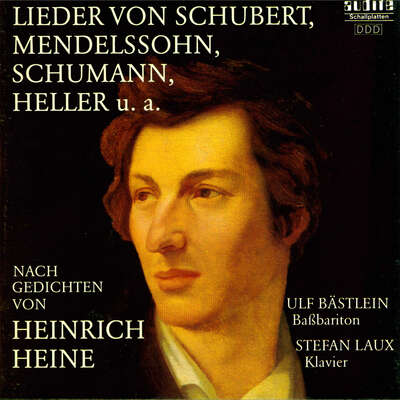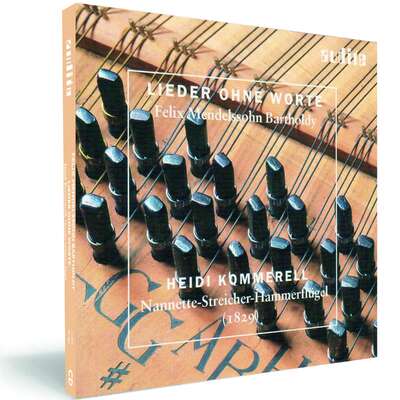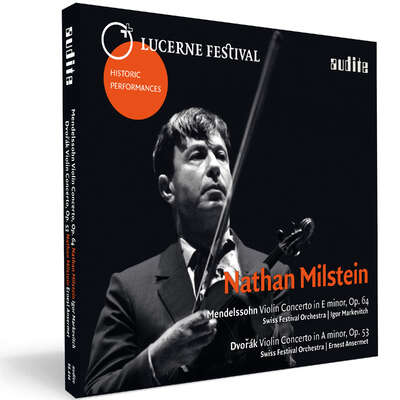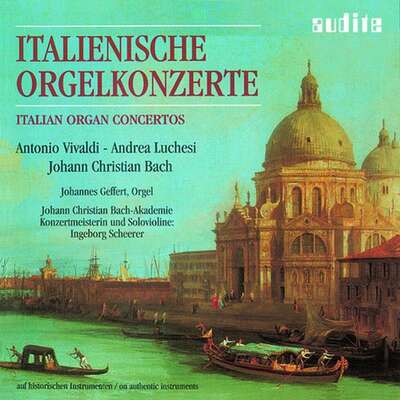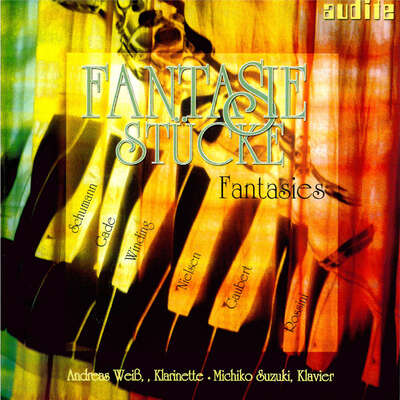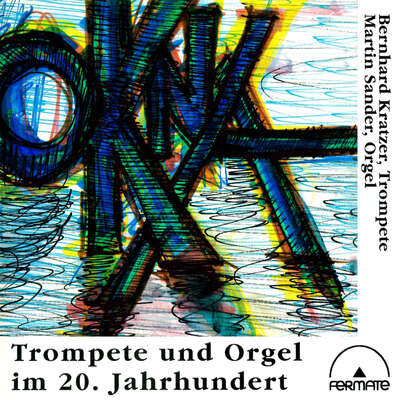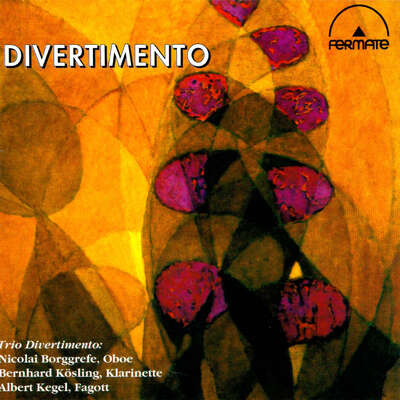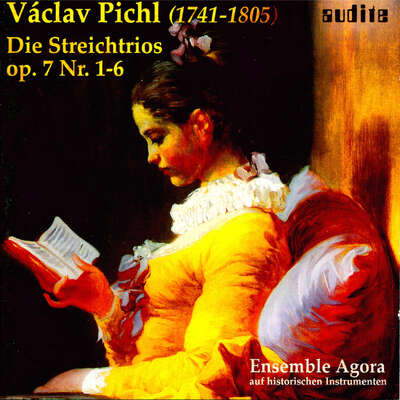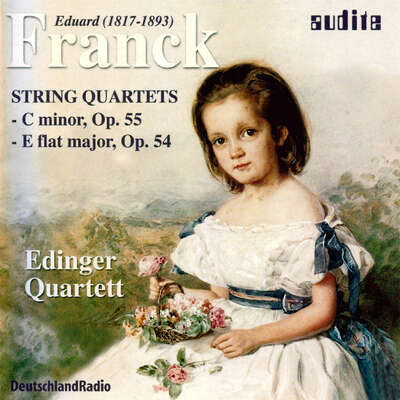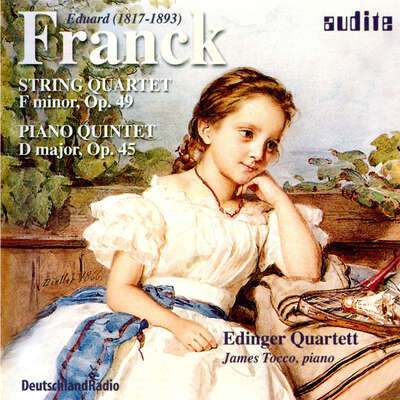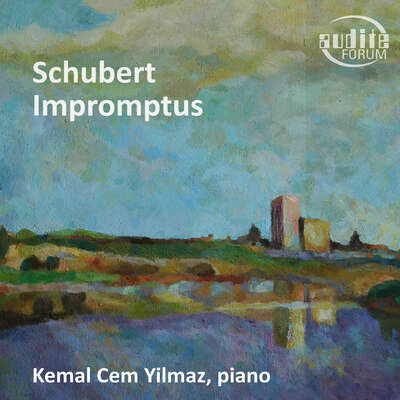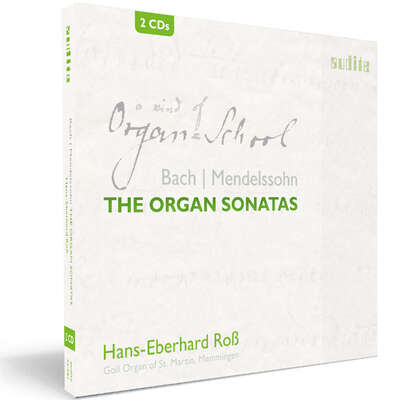
Mit der vorliegenden Aufnahme schließt das Mandelring Quartett die Gesamteinspielung von Mendelssohns Kammermusik-Werken für Streicher ab. Im vierten und abschließenden Volume der Serie macht sich das Mandelring Quartett für eine Gattung stark, die immer im Schatten des noblen Streichquartetts stand: das Quintett für zwei Geigen, zwei Bratschen und Violoncello. Zweimal hat Mendelssohn als junges Genie und als arrivierter Musiker für die Besetzung geschrieben – und zweimal entstanden dabei Meisterwerke von prächtiger Klangfülle und mitreißendem Elan.mehr
"Das Mandelring-Quartett spielt hier mit genau jener expressiven Glut, die schon die vorangehenden Folgen der Mendelssohn-Aufnahme durchlodert hat, und entfacht gemeinsam mit dem Bratschisten Gunter Teuffel eine bisweilen orchestrale Klangfülle." (Fono Forum)
Details
|
Felix Mendelssohn Bartholdy: String Quintets in A major (Op. 18 No. 1) & in B flat major (Op. 87 No. 2) & Four Pieces for String Quartet (Op. 81)
Felix Mendelssohn Bartholdy: Complete Chamber Music for Strings, Vol. 4 |
|
| Artikelnummer: | 92.659 |
|---|---|
| EAN-Code: | 4022143926593 |
| Preisgruppe: | ACX |
| Veröffentlichungsdatum: | 4. April 2014 |
| Spielzeit: | 69 min. |
Zusatzmaterial
Informationen
Mit der vorliegenden Aufnahme schließt das Mandelring Quartett die audite-Gesamteinspielung von Mendelssohns Kammermusik-Werken für Streicher ab. Neben dem gewichtigen Korpus von acht Werken für Streichquartett und dem Oktett op. 20 werden Mendelssohns Quintette für zwei Geigen, zwei Bratschen und Violoncello gern übersehen. Dass diese Vernachlässigung eher mit der Gattung als mit den Werken selbst zu tun hat, die beide große Würfe sind, beweist diese Einspielung. Das Quintett A-Dur op. 18 stammt noch aus der Berliner Lehrzeit und entstand 1826 - kurz nach dem Umzug der Mendelssohns in eine prächtige Villa in der Leipziger Straße, die nicht nur für Lea Mendelssohns berühmten Salon, sondern auch für musikalische Darbietungen genügend Raum und Atmosphäre bot. Felix Mendelssohn, der in seinen jungen Jahren die großen Vorbilder von Bach bis Beethoven studierte und weiterentwickelte, orientierte sich in seinem ersten Quintett vor allem an Mozart: am Charme seiner melodischen Einfälle, an der durchsichtigen Klangfülle der um eine Bratsche erweiterten Besetzung und am kontrapunktisch verdichteten Netzwerk der Themen und Motive. Fast zwanzig Jahre später erst kehrte Mendelssohn zum Streichquintett zurück - in einer Phase der persönlichen Besinnung und Arbeitspause, die der vielbeschäftigte Dirigent, Berliner Generalmusikdirektor und Leipziger Konservatoriumsdirektor im Kurort Bad Soden im Taunus einlegte. Das Quintett B-Dur, das er hier zu Papier brachte, spiegelt diesmal seine sinfonische Erfahrung. Mit orchestraler Wucht, über bebenden Unterstimmen, erhebt sich die erste Geige zu Beginn mit einem jubelnden Thema - eine Stimmung, die in den Ecksätzen beibehalten und in den beiden Mittel-sätzen durch intimere Farben kontrastiert wird. Die zwei Einzelsätze für Streichquartett aus den posthum gedruckten Vier Stücken für Streichquartett op. 81 - das Capriccio von 1843 und eine Fuge aus der Jugendzeit - komplettieren die Gesamteinspielung.
Besprechungen
Muzyka21 | 6 (179) – czerwiec 2015 – rok XVI | Łukasz Kaczmarek | 1. Juni 2015
Taką interpretację oferuje nam właśnie zespół Mandelring Quartet. Omawiając dwa pierwsze woluminy serii zwracałem uwagę na dużą klasę artystyczną zespołu, wysoki poziom wykonania i takie jego cechy, jak niezwykła emocjonalność, dramatyzm. I nic się nie zmieniło. Zespół stara się przedstawić kompozycje Mendelssohna w możliwie najbardziej pasjonujący sposób. W grze muzyków po prostu słychać szczery zachwyt, który udziela się i słuchaczowi.Mehr lesen
Vårt Land
| Tirsdag 20. Januar 2015 | Olav Egil Aune | 20. Januar 2015
Romantikkens svar på krystall
Strykekvartettene: Mendelssohn hadde vår i hodet. Vår og melankoli
Ingen, selv ikke den argeste kritiker, kan styre hvordan musikk blir spilt.Mehr lesen
Música y Educación | 01.01.2015 | 1. Januar 2015
Cuarto volumen de la obra de cámara de Mendelssohn que el CuartetoMehr lesen
American Record Guide | December 2014 | Greg Pagel | 1. Dezember 2014
Haydn, the “father of the string quartet”, never wrote a quintet for strings; nor did many classical composers (but Mozart did). As stated in theMehr lesen
Quintet 1 bears the opus number 18, though it was in fact composed after Mendelssohn’s great Octet, Op. 20. This quintet is rarely performed, possibly because it is eclipsed by the monumental Octet, but I would not call it a minor work. It is mature, yet youthful in its exuberance. As the notes tell us, Mendelssohn here is “paying tribute to Mozart in tone-color, but thinking harmonically in romantic directions”. Quintet 2 was composed almost 20 years later, and it is full-blown romanticism. It opens with a heroic theme over tremolos, and almost never loses steam. Even III, Adagio, takes full advantage of the five instruments to produce a full-bodied, broad sound. IV sounds almost orchestral. The Pieces for Quartet, Op. 81 are charming minor works discovered and published after the composer’s death.
This is Volume IV in Mandelring’s cycle of Mendelssohn’s complete chamber music for strings. I had the pleasure of reviewing Volume III (Octet, Quartet 5, and Pieces 1+2—May/June 2014), and this volume is also a delight. The Mandelring Quartet has a reputation for a homogeneous tone, and this quality is maintained when the ensemble is augmented (or doubled!). Perfect engineering, good notes. A must-have for lovers of chamber music for strings.
The Strad | October 2014 | Julian Haylock | 1. Oktober 2014 A recording that brings out the neo-Classical side of the composer's character
These are precision-engineered performances, which delight in the composer's Mozartian deftness and structural seamlessness rather than indulge his propensity for Romantic emotional narrative. They create the ideal sound world – transparent, lighttextured, immaculately balanced, nimbly articulated – and sustain remarkably pure intonation and precise ensemble throughout.Mehr lesen
Record Geijutsu | 10/2014 | 1. Oktober 2014
Japanische Rezension siehe PDF!Mehr lesen
Gramophone | September 2014 | Caroline Gill | 1. September 2014
This is the final volume in the Mandelring Quartet's complete survey of Mendelssohn's chamber music for strings, and as its predecessors have provedMehr lesen
It doesn't disappoint, with the contrast in outlook and maturity between the early works and their more adult examples as happily apparent as ever in the difference in character and youthful buoyancy they bring out in each. The phrasing, particularly in the slow movements, may be sinuous and sustained but the articulation remains adequately spartan to allow the music to shine through as the art it was, rather than the purely cerebral achievements of a prodigy testing out his new-found skills. It drives Mendelssohn's enthralling musical ideas with the kind of conviction that makes it difficult to turn off this disc without listening from beginning to end. It is recorded with their customary clarity, too, which adds an extra dimension to their performance, particularly in the last two movements of the Four Pieces: in the more muscular passages of the Fugue, where Mendelssohn uses its subject in repeatedly different and increasingly outlandish scenarios, and in the spontaneity of the two contrasting sections of the Capriccio.
Everything the Mandelrings have to throw at these pieces shows them to their best advantage - fleet-footed bowing, tongue-in-groove intonation and ensemble, and a sense of momentum that always drives the music in the right direction. The definitive set is complete.
www.SA-CD.net | August 30, 2014 | Polly Nomial | 30. August 2014 A fitting conclusion to the Mandelring's Mendelssohn cycle
Audite's engineering team, as ever, serve the music and the Mandelring's impeccably well. A very believable sense of positioning and presence comes across.<br /> Very strongly recommended (along with the other issues of this superb cycle).Mehr lesen
Very strongly recommended (along with the other issues of this superb cycle).
www.pizzicato.lu | 27/06/2014 | 27. Juni 2014 Ein Kraftwerk
Noch lange nach der letzten Note ist der Adrenalin-Spiegel hoch. Mit berstender Energie reißen uns das Mandelring Quartett und Günter Teuffel mit inMehr lesen
Hier ist kein Platz für pathetisch-romantisches Gehabe, das Innenleben der Partituren wird geradezu schonungslos aufgedeckt. Dies gelingt nur dank der totalen Hingabe der fünf Musiker, dank ihres unverbrüchlichen Einvernehmens in musikalischen Fragen und einer stupenden Quintett-Virtuosität.
Nur selten hat man Kammermusik von der ersten Note an so zupackend, innerlich aufgewühlt erlebt, so rhetorisch fesselnd als hätte man eben einen Energieriegel verschluckt. Ein krönender Abschluss dieser epochalen Mendelssohn-Integrale.
With a totally committed and highly energetic playing, the Mandelring Quartet and Günter Teuffel achieve a gripping and shaking performance. A fabulous last disc for an epochal Mendelssohn series.
Vorarlberger Nachrichten | Samstag/Sonntag, 21./22. Juni 2014 | Fritz Jurmann | 21. Juni 2014 CD-Tipps zur Schubertiade
Gunter Teufel an der zweiten Viola fügt sich nahtlos ins Quartett, das heuer als eines der führenden Quartette seiner Generation voll Stolz sein 30-jähriges Bestehen feiert: in packenden Interpretationen mit einem Höchstmaß an Charme und Klarheit.Mehr lesen
International Record Review | June 2014 | Michael Jameson | 1. Juni 2014
Mendelssohn's quintets for strings provide an engaging addendum to his string quartets and to the Octet in E flat major, Op. 20, though neither isMehr lesen
These expert and sophisticated new performances bring the Mandelring Quartett's survey of Mendelssohn's string chamber music to its close, with the same qualities of passionate and authoritative playing that distinguished previous issues in this series (Volumes I and 3 were reviewed in July / August 2012 and January 2014 respectively). The players are joined by the violist Gunter Teuffel, who is a respected chamber musician in his own right as well as being principal viola of the SWR Radiosinfonieorchester Stuttgart.
Those following this series will probably want to obtain this recording anyway, but listeners still unfamiliar with the Mandelrings' playing will find plenty to enjoy in these dedicated and attractive performances. The early Op. 18 Quintet, written in the composer's seventeenth year, shares much of the prodigal inventiveness and originality of Mendelssohn's other youthful works. Not quite as dazzling as the Octet, the Quintet nevertheless displays a remarkable assurance and formal mastery, and the Mandelrings play it with panache and commitment in this vibrantly wide-ranging SACD recording.
The later Op. 87 Quintet, however, seems to have had a more troubled gestation. Ignaz Moscheles described how the finale in particular unsettled the composer, who revised it several times, explaining that 'Mendelssohn purports that the last piece isn't good'. It may well prove that the finale is perhaps too lightweight to counterpoise the more sonorously reflective tone of the other movements, but whatever the case, Mendelssohn saw to it that the piece was not issued during his lifetime.
However, on the basis of this spirited and insightful new account, his concerns would seem largely unfounded, and the Mandelrings play the work fondly and attentively. But while this new disc of the String Quintets eclipses Hyperion's slightly edgy recording (now reissued on the budget Helios label) from the Raphael Ensemble, there's not a great deal to choose between these accounts in performance terms. Both offer well-judged, absorbing playing that lacks nothing technically, but Audite's SACD sonics bring a spatial depth and realism combined with huge dynamic range not matched by the Helios CD.
There remains another strong contender here, in the form of the Newton Classics coupling featuring the cellist Anner Bylsma's period-performance group, L'Archibudelli. Playing on gut strings, and using bows and instrumental set-ups which closely resemble those of Mendelssohn's era, L' Archibudelli's accounts have a lighter touch and a naturally expressive warmth which proves especially pleasing in the slow movements. What you don't get to the same degree, though, is the pungency of attack and sustaining power that modern practices afford, and the whole effect seems just a little undernourished by comparison with the excellent Mandelring accounts.
For the sake of completeness, Audite has found room here for two of the four posthumously issued pieces for string quartet, published as Mendelssohn's Op. 81 in 1849, the 'Capriccio' and 'Fugue'. If the latter seems to resemble a formally erudite contrapuntal study, the verve and brilliance of the former ensures that the Mandelring's Mendelssohn traversal reaches an exciting and assured conclusion. This has been a happy adventure from the start and this series must now be rated as a prime option of choice in these works. Michael Struck-Schloen's engaging booklet notes make out just as compelling a case for these marginalized works as the performances themselves. Recommended.
BBC Music Magazine | June 2014 | JD | 1. Juni 2014
Mendelssohn's String Quintets are hugely rewarding, rich and vital pieces. The Mandelring Quartet and Gunther Teuffel present full-on interpretations,Mehr lesen
Fono Forum | Juni 2014 | Marcus Stäbler | 1. Juni 2014 Expressive Glut
Mit der vierten und letzten Folge seiner Mendelssohn-Einspielung ist das Mandelring-Quartett bei den Werken angelangt, die am seltensten aufgeführtMehr lesen
Die vorzügliche Aufnahme macht die Antwort auf diese Frage nicht leichter. Gerade das zweite Quintett op. 87, 1845 entstanden, fesselt den Hörer vom ersten bis zum letzten Takt mit einer Fülle an Ideen und prägnanten Charakteren, die der Komponist zu einem Meisterwerk gebündelt hat. Vom beschwingten Walzercharme des Andante führt ein Spannungsbogen über die dramatischen Gesten im Adagio direkt bis ins Finale, dessen musikalische Stromstöße die Energie des Kopfsatzes wieder aufnehmen.
Das Mandelring-Quartett spielt hier mit genau jener expressiven Glut, die schon die vorangehenden Folgen der Mendelssohn-Aufnahme durchlodert hat, und entfacht gemeinsam mit dem Bratschisten Gunter Teuffel eine bisweilen orchestrale Klangfülle. Die reizt der Komponist im ersten Quintett op. 18 noch etwas sparsamer, aber gleichwohl bereits sehr effektsicher aus. Gerade im Kopfsatz nutzt er die Möglichkeiten der erweiterten Besetzung, um eine Steigerung von geradezu sinfonischer Kraft zu inszenieren. Umso stärker wirkt dann der Kontrast zu den elfenhaft huschenden Staccati im Scherzo und dem virtuos wirbelnden Finale. Dem Mandelring-Quartett kann man nur zum geglückten Abschluss einer hervorragenden Gesamteinspielung gratulieren. Und allen anderen Ensembles zurufen: Ran an den Speck!
Musica | numero 257 - giugno 2014 | Massimo Viazzo | 1. Juni 2014
l’ensemble tedesco sfoggia solidità e sicurezza tecnicaMehr lesen
Der Reinbeker | 25. Mai 2014 (50. Jahr, Nr. 10) | Peter Steder | 26. Mai 2014 Werke zweier Jubilare
Technische Perfektion? Selbstverständlich. Gestaltungskompetenz? Unbestritten. Besonders ohrenfällig: die Durchsichtigkeit des Stimmengeflechts. [...] Die jüngsten Einspielungen dürften auf lange Sicht den Rang von Referenzaufnahmen haben.Mehr lesen
http://theclassicalreviewer.blogspot.de | Wednesday, 14 May 2014 | 14. Mai 2014 This final instalment of the Mandelring Quartet’s Mendelssohn series for Audite makes a worthy conclusion to a cycle that must shoot to the top of any recommendation
The performances of the Quintets cannot fail to win new enthusiasts for these wonderful works. They receive a first rate recording and there are excellent booklet notes. This final instalment in this Mendelssohn series makes a worthy conclusion to a cycle that must shoot to the top of any recommendation.Mehr lesen
The Guardian | Thursday 24 April 2014 | Andrew Clements | 24. April 2014 Mendelssohn: String Quintets Nos 1 & 2, etc review – an over-serious take lacking exuberance
Mendelssohn's two string quintets, using a second viola à la Mozart ratherMehr lesen
www.amazon.de | 13. April 2014 | Charlotte Voss | 13. April 2014 | Quelle: https://www.amaz... Vielschichtig, fesselnd, professionelle Klangqualität, renommiertes Quartett
Vielschichtige Klangfarben werden bei dieser Aufnahme erlebbar. Die Qualität ist im wahrsten Sinne des Wortes berauschend. Das renommierte MandelringMehr lesen
www.pizzicato.lu | 31/03/2014 | Remy Franck | 31. März 2014 Mendelssohns Reden
Die vierte Folge der gesamten Kammermusik von Felix Mendelssohn mit dem Mandelring Quartett ist die würdige Nachfolgerin der drei ersten Volumes. DieMehr lesen
Die Klarheit des Klangbilds, wo kein Instrument das andere in den Klangschatten stellt, ist ein weiterer Vorzug einer singulären musikalischen Spitzenproduktion.
This 4th volume confirms our impressions from earlier releases: Mandelring’s Mendelsohn is musically and technically outstanding. Through this quartet, the composer becomes one really great orator.
Neuigkeiten
Vielschichtig, fesselnd, professionelle Klangqualität, renommiertes Quartett
Oto dwa kolejne – i chyba już ostatnie – woluminy z muzyką kameralną na...
Cuarto volumen de la obra de cámara de Mendelssohn que el Cuarteto Mandelring...
Haydn, the “father of the string quartet”, never wrote a quintet for...
A recording that brings out the neo-Classical side of the composer's character
This is the final volume in the Mandelring Quartet's complete survey of...
Mendelssohn's quintets for strings provide an engaging addendum to his string...
Mendelssohn's String Quintets are hugely rewarding, rich and vital pieces. The...
Eccoci giunti al quarto volume dell’omnia cameristica mendelssohniana per...
This final instalment of the Mandelring Quartet’s Mendelssohn series for Audite makes a worthy conclusion to a cycle that must shoot to the top of any recommendation
Mendelssohn: String Quintets Nos 1 & 2, etc review – an over-serious take lacking exuberance
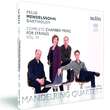

























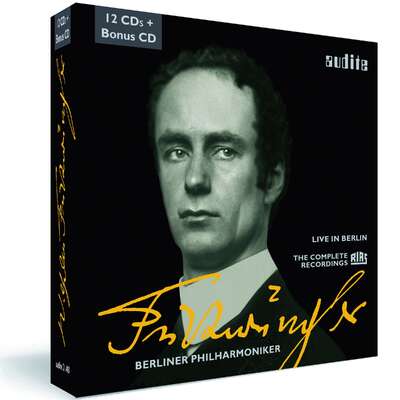
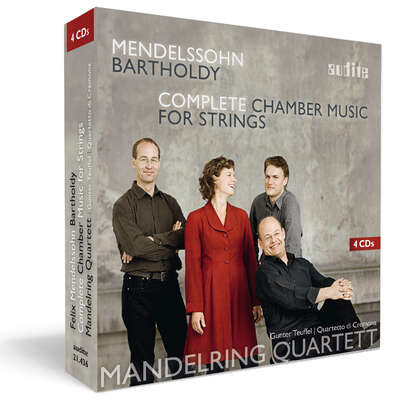
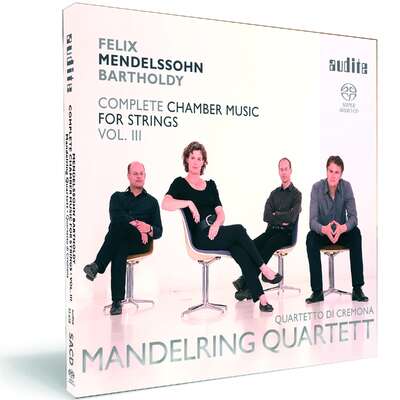
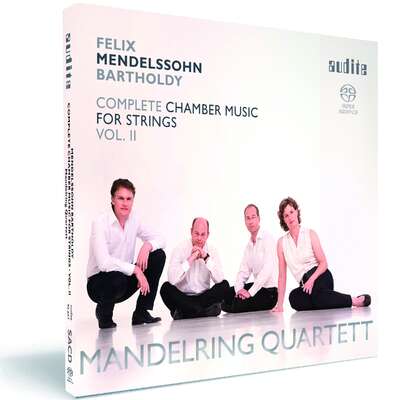
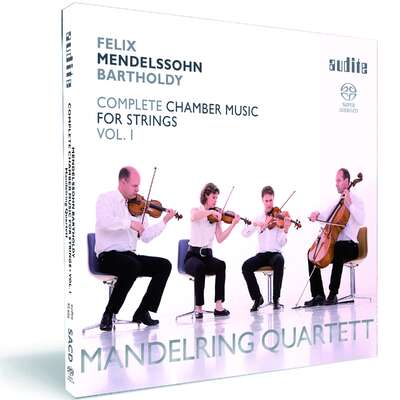
![23446 - k[NOW]n Piano](/image/product/3d/carousel/23446-known_piano.jpg)
